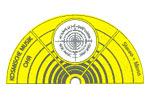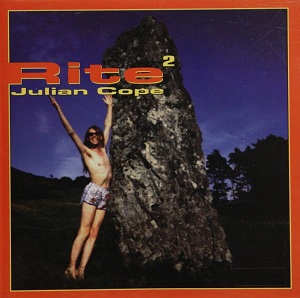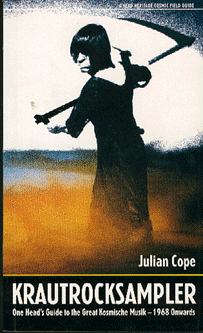Krautrock is a broad genre of experimental rock that developed in West Germany in the late 1960s and early 1970s. It originated among artists who blended elements of psychedelic rock, avant-garde composition, and electronic music, among other eclectic sources. Common elements included hypnotic rhythms, extended improvisation, musique concrète techniques, and early synthesizers, while the music generally moved away from the rhythm & blues roots and song structure found in traditional Anglo-American rock music. Prominent groups associated with the krautrock label included Neu!, Can, Faust, Tangerine Dream, Kraftwerk, Cluster, Ash Ra Tempel, Popol Vuh, Amon Düül II and Harmonia.

Julian David Cope is an English musician and author. He was the singer and songwriter in Liverpool post-punk band The Teardrop Explodes and has followed a solo career since 1983 in addition to working on musical side projects such as Queen Elizabeth, Brain Donor and Black Sheep.
Amon Düül was a West German political art commune formed out of the student movement of the 1960s that became well known for its free-form musical improvisations. This spawned two rock groups, Amon Düül and the more famous Amon Düül II. After both groups disbanded in the 1970s, some of the original members reunited in the 1980s under the name Amon Düül again, though this incarnation is commonly referred to as Amon Düül UK to avoid confusion with earlier versions of the band.

Amon Düül II is a German rock band formed in 1968. The group is generally considered to be one of the pioneers of the West German krautrock scene. Their 1970 album Yeti was described by British magazine The Wire as "one of the cornerstones of ... the entire Krautrock movement".

Black Monk Time is the only studio album by German-based American rock band The Monks. It was released in March 1966 through Polydor Records and was the only album released during the band's original incarnation. The album's subversive style and lyrical content was radical for its time and today is considered an important landmark in the development of punk rock.

Wolf City is the fifth studio album released by the German rock band Amon Düül II.
Uli Trepte was a German musician best known for his collaborations with various influential Krautrock bands in the early 1970s.

Yeti is the second studio album by German rock band Amon Düül II, first released in April 1970 on Liberty as a double LP. The album was produced by Olaf Kübler and Amon Düül II, and engineered by Willy Schmidt, "with a little help of Siegfried E. Loch". Including both short songs and longer, improvisational tracks, British avant-garde music magazine The Wire describes Yeti as "one of the cornerstones of both Amon Düül's career and the entire Krautrock movement".

Florian Fricke (1944–2001) was a German musician who started his professional career with electronic music, using the Moog synthesizer, and was a founding member of the German rock group Popol Vuh.

Japrocksampler: How the Post-war Japanese Blew Their Minds on Rock 'n' Roll is a book written by author and musician Julian Cope and published by Bloomsbury on 3 September 2007.

Deluxe is the second album from the West German krautrock group Harmonia, consisting of Neu! guitarist Michael Rother and the duo Cluster. It was recorded in June 1975 in Harmonia's studio in Forst, Germany. It was first released on the Brain Records label in 1975.

Ohr ("Ear") was an influential German electronic/experimental record label set up by Rolf-Ulrich Kaiser in 1970.

Cosmic Couriers / Cosmic Music was a German experimental/space-rock label set up by Rolf-Ulrich Kaiser in 1973 following his association with Ohr and Pilz. A number of influential records in the Krautrock genre were released on Cosmic Couriers, including Klaus Schulze's Cyborg and Ash Ra Tempel/Timothy Leary's Seven Up.
Christoph "Chris" Karrer is a German guitarist and composer. He also plays oud, saxophone and violin. He is known as co-founder of the Amon Düül commune and a member of the related and much more commercially successful project Amon Düül II and for his collaboration with Embryo. With his band Amon Düül II he composed film music for Rainer Werner Fassbinder's Niklashauser Fart and Hans-Jürgen Syberberg's film San Domingo.

Rite² is an ambient music album by Julian Cope, released in 1997. It is technically Cope's fourteenth solo album, but is also the follow-up to the earlier album Rite and is the second in the Rite series.
Rolf-Ulrich Kaiser is a German writer and record producer. He is best known as the founder of the Ohr, Pilz, and Cosmic Couriers record labels. These labels released many of the earliest Krautrock albums in the early 1970s, and Kaiser is often cited as a pivotal figure in the development of the genre.
Electronic rock is a music genre that involves a combination of rock music and electronic music, featuring instruments typically found within both genres. It originates from the late 1960s, when rock bands began incorporating electronic instrumentation into their music. Electronic rock acts usually fuse elements from other music styles, including punk rock, industrial rock, hip hop, techno, and synth-pop, which has helped spur subgenres such as indietronica, dance-punk, and electroclash.

Romantic Warriors IV: Krautrock is a trilogy of feature-length documentaries about progressive music written and directed by Adele Schmidt and José Zegarra Holder. RW4 focuses on the progressive rock music from Germany popularly known as Krautrock, although the integration of Krautrock into the progressive rock genre is a purely American notion. In Europe, the conventional wisdom is that Krautrock can be considered at most as the connection between psychedelic rock and progressive rock. The term "Krautrock" was applied after-the-fact by British journalists, and in fact the German bands share very few similarities.

Gerhard Augustin was a German music producer. He was the first professional disc jockey in Germany and co-founder of the music program Beat-Club. Augustin helped generate a shift in German culture by introducing various genres of music at a time when schlager was the standard by giving exposure to krautrock bands such as Amon Düül II and Popol Vuh. He later became the head of A&R for United Artists Records in Munich, and then the producer and manager for American R&B duo Ike & Tina Turner.
Captain Trip Records is a Japanese music label founded and run by musician Ken Matsutani. The label specializes in experimental music and various subgenres of rock, particularly psychedelic rock and progressive rock. In addition to the publication of new albums, it has also devoted itself to the reissue of out-of-print records, as well as unreleased old material.













